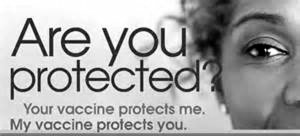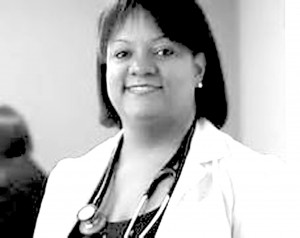Vaccination rates still too low among African-American seniors
8th August 2016 · 0 Comments
By Susan Buchanan
Contributing Writer
More African-American seniors are getting vaccinated as access to health care improves and myths fade, but greater awareness is needed, Dr. Regina Benjamin said last week. In particular, seniors need protection against pneumococcal pneumonia, flu, shingles and tetanus. Benjamin, who practices in Alabama, was the eighteenth United States Surgeon General under President Obama.
This month, she is partnering with New York-based pharmaceutical giant, Pfizer Inc., to alert seniors, especially people of color, about pneumococcal pneumonia—which can be deadly. Spread by coughing and sneezing, the disease develops when bacteria enters the lungs. It can infect the blood and nervous system. Symptoms include fever, chills, coughing, shortness of breath and chest pain. Adults over 65 are especially vulnerable.
“Prevention through vaccinations is key to the foundation of my work as a family physician,” Benjamin said. She started her clinic in the fishing village of Bayou La Batre in Mobile County in 1990. This month, communities along the Gulf Coast are focused on back-to-school immunizations, but adults need vaccinations too. “As people get older, their immune systems weaken, leaving them at high risk for pneumococcal pneumonia,” Benjamin said. August is National Immunization Awareness Month, according to Centers for Disease Control and Prevention.
African-American and Hispanic seniors have less access to preventive services than most of the population, Benjamin said. Among African-American adults over 65, fewer than half of them receive their recommended vaccinations.
Access to health care among African Americans has improved, and insurance coverage has expanded under the Affordable Care Act. Since the act’s passage in 2010, 2.3 million African Americans—from ages 18 to 64 — have received coverage, the U.S. Department of Health and Human Services said last year. Obamacare reformed Medicare and Medicaid to give seniors better health coverage. But “even with the major strides we’ve seen, too many in the African-American community remain uninsured,” HHS said last year.
Fear of the medical establishment has prevented some African-American adults from getting vaccinations. “In general, people are afraid of the unknown,” Benjamin said. “They don’t know what’s in vaccines.” And worse, in the case of African-American seniors, memories of past medical studies linger. “In 1940s, 50s and 60s, you had the Tuskegee Experiment,” she said. “African Americans were guinea pigs. But that’s all changed now. Policies are in place worldwide to keep that from happening today.”
From 1932 to 1972 in Macon County, Ala., the U.S. Public Health Service ran The Tuskegee Study of Untreated Syphilis in the Negro Male. The study administered non-therapeutic spinal taps, with the promise of free treatment of diseases. Penicillin, a therapy for syphilis by the late 1940s, could have helped many of the study’s participants. But penicillin was withheld from them.
Dr. Benjamin didn’t mention it last week, but talk circulated in the 1980s about HIV/AIDs having been introduced in African-American communities as an experiment. And more recently, the public has worried that vaccines may cause autism among African American and other children.
In recent decades, rules about treatment of participants in medical studies have been tightened, following the National Research Act, passed by Congress in 1974. Today’s studies require that they be told their diagnoses and that test results be accurately reported. Institutional review boards or ethics committees—which include non-medical people, along with experts—assess studies and protect participants.
Benjamin sees patients in a town of 2,500 people. “It’s a Federally Qualified Health Clinic, or FQHC, look-alike, serving everyone and anywhere,” she said. “The patients I see can’t afford to get sick. We have lots of very active over 65-year-olds, and to stay active, they need their vaccinations.”
For its part, greater New Orleans has ten Federally Qualified Health Clinics in its safety net. FQHCs qualify for reimbursement from Medicare and Medicaid and must care for undeserved populations. They provide comprehensive services—including vaccines—offer sliding fees to patients depending on income, and have quality-assurance programs.
But like much of the nation, African Americans in the Crescent City have lower rates of insurance coverage and poorer health outcomes than white residents, according to the New Orleans Community Health Improvement Plan, released by the city in May of last year.
Nationally, just over three-fifths of adults 65 years and older had ever received a pneumococcal vaccination, based on 2014 data, according to the CDC. A goal of Healthy People 2020, a disease-prevention campaign launched by HHS in 2010, is to achieve at least 90 percent coverage with the pneumococcal polysaccharide vaccine for those 65 and above.
“You can prevent so many forms of dying by getting a shot,” Benjamin said. If you have senior relatives, “you’d never forgive yourself if someone died of a disease that you could have helped prevent by seeing that they got that shot.”
In familiar, but not-always heeded advice, seniors need to wash their hands often, eat right and exercise to fend off disease, Benjamin also said. She has a B.S. in chemistry from Xavier University of Louisiana, an M.D. degree from the University of Alabama at Birmingham and an M.B.A. from Tulane University. She was named the Endowed Chair in Public Health at Xavier in 2013.
This article originally published in the August 8, 2016 print edition of The Louisiana Weekly newspaper.




